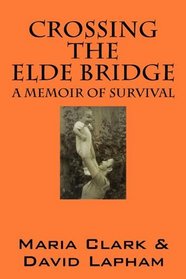Search -
Crossing the Elde Bridge: A Memoir of Survival
Crossing the Elde Bridge A Memoir of Survival
Author:
CROSSING THE ELDE BRIDGE: A Memoir of Survival — Maria, a young, Catholic Austro-Hungarian, was born into a wealthy, aristocratic family, and lived a privileged, if isolated, childhood schooled by her mother and two governesses. Days before Christmas 1939 the young teenager was snatched from the fairy tale world she lived in by the... more »
Author:
CROSSING THE ELDE BRIDGE: A Memoir of Survival — Maria, a young, Catholic Austro-Hungarian, was born into a wealthy, aristocratic family, and lived a privileged, if isolated, childhood schooled by her mother and two governesses. Days before Christmas 1939 the young teenager was snatched from the fairy tale world she lived in by the... more »
ISBN-13: 9781432752071
ISBN-10: 1432752073
Publication Date: 1/29/2010
Pages: 200
Rating: ?
ISBN-10: 1432752073
Publication Date: 1/29/2010
Pages: 200
Rating: ?
0 stars, based on 0 rating




